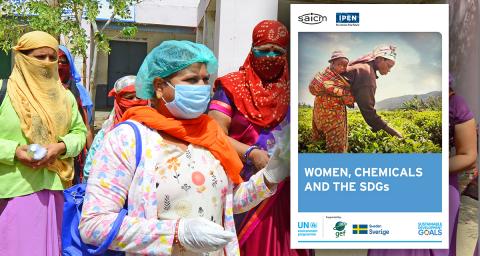New report: Gender inequalities exacerbated by exposure to hazardous chemicals

Gothenburg, Sweden Women are disproportionally impacted by exposure to chemicals and wastes and under-represented in the governments and private industries that are making decisions about how hazardous chemicals will be used and manufactured. This finding comes from a new report released today to commemorate International Women's Day. The report highlights the effects toxic chemicals have on women around the world while recognizing the key role women play as key agents of change at all levels of society.
“Gender inequalities impact exposure to toxic chemicals at all levels. In the boardrooms and where decisions are being made, women are under-represented and at work they often lack safety information and access to properly fitting protective equipment. And as the carriers of future generations, they face special vulnerabilities from toxic exposure. All of these inequalities lead in many cases to higher impact of toxic chemicals on women. At the same time, we are encouraged that women, in many countries are leading the way in addressing these practical and structural inequalities” said Dr. Sara Brosché, Science Advisor to IPEN and lead author of the report.
The new report, Women, Chemicals and the SDGs, was written and released by the global NGO network, International Pollutants Elimination Network (IPEN), in collaboration with the UN Environment Programme. The report describes how both gender – the social attributes and opportunities associated with being male or female – and biological sex impact the severity of chemical exposure and the resulting health impacts a woman, and the baby she may be carrying, may experience. It also provides concrete recommendations to safeguard the health of women and empower women to continue to be leaders towards a more equal future.
Among the report's recommendations:
- Adopt policies focusing on phasing out hazardous chemicals with an especially high impact on women and prevent pregnant women from working with hazardous chemicals. Where not possible, prevent exposure through access to information, training and adequate protective equipment
- Provide additional analysis of the global burden of disease related to women and chemicals and the integral role of women and chemicals in the sound management of chemicals and waste, including in the in the SAICM Beyond 2020 process.
- Ensure women’s full and effective participation and equal opportunities for leadership at all levels of decision-making in political, economic and public life.
Dr. Brosche concluded. “The report makes it clear that we cannot achieve the 2030 Sustainable Development Goals established by United Nations Member States in 2015 or the goals of sound chemical management unless there is gender equality. If we are serious about these international processes, then all people, irrespective of gender identity or biological sex, should have the same rights to be safe from toxic chemicals and the opportunity to participate in decision-making at every level.”
About the report: Women, Chemicals and the SDGs was developed within the framework of the Global Environment Facility (GEF) project on Global Best Practices on Emerging Chemical Policy Issues of Concern under the Strategic Approach to International Chemicals Management (SAICM), executed by the SAICM Secretariat. It was produced with co-finance from the Swedish Government. While this report was produced with the assistance of the Global Environment Facility, UN Environment and the Swedish Government, they do not necessarily share the expressed views and interpretations, and responsibility for the content lies entirely with IPEN.
About IPEN (International Pollutants Elimination Network)
IPEN is a global network forging a healthier world where people and the environment are no longer harmed by the production, use, and disposal of toxic chemicals. Over 600 public interest NGOs in more than 124 countries, largely low-and middle-income nations, comprise IPEN and work to strengthen global and national chemicals and waste policies, contribute to ground-breaking research, and build a global movement for a toxics-free future. To learn more, visit us at ipen.org, @ToxicsFree
